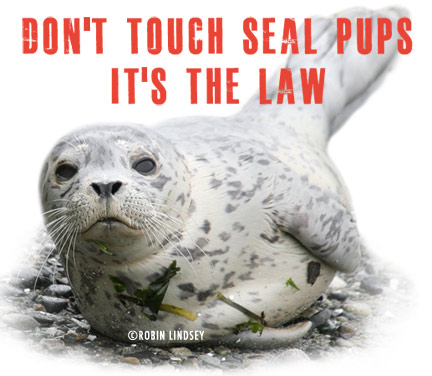Rash of illegal pickups of seal pups prompts investigations
Aug/01/14 06:01 AM
Harbor seal pupping season is well underway in South Puget Sound - and virtually all outer coast and inland Washington waterways. Seal haulouts are brimming with harbor seal moms and pups. Nursing age and newly weaned pups are resting along our shorelines, both in rural and urban areas. The West Coast Marine Mammal Stranding Network across the Pacific Northwest does our best to spread the word to “leave seal pups alone”. However, each season brings with it more cases of human interference, too often with drastic consequences for the animals.
Don’t touch seal pups - it is a violation of Federal and State Law. All marine mammals are protected from harassment by both the Federal Marine Mammal Protection Act (punishable by fines up to $10,000 and one year in jail) and Washington State law RCW 77.15.130 (a criminal misdemeanor, mandatory court appearance, punishable with up to 90 days in jail and up to $1000 fine).
 Recently, there has been a rash of illegal pickups and handling of harbor seals. In one case, a pup was wrapped in a blanket, causing him to overheat and die. In another incident, human interference caused abandonment and the pup was forced into a rehab facility.
Recently, there has been a rash of illegal pickups and handling of harbor seals. In one case, a pup was wrapped in a blanket, causing him to overheat and die. In another incident, human interference caused abandonment and the pup was forced into a rehab facility.
These cases and others are being investigated for prosecution by NOAA Office for Law Enforcement and Washington Department of Fish and Wildlife Enforcement.
COMMON MISTAKES THAT CAN RESULT IN HARM TO SEAL PUPS (AND ARE UNDER PENALTY OF LAW):
We can’t stress enough that while pups may look vulnerable alone on the beach, be assured that most likely there is no cause for alarm. If a pup is not strong enough to swim for great lengths, he sometimes rests onshore while mom observes from the waters nearby. Because there is no mom in sight does not mean the pup is abandoned. Stay back and observe quietly from a distance. Keep dogs leashed and away. Adult seals are wary and any perceived threat or disturbance by humans and dogs can indeed cause abandonment. Respect seals’ space and share the shore by giving them a wide berth.
If you have concerns about the health or safety of a seal, call NOAA’s hotline @ 1-866-767-6114. For a seal pup (or other marine mammal) onshore in urban West Seattle, please call the Seal Sitters hotline @ 206-905- SEAL (7325).
Please click here to read NOAA’s “Share the Shore with Harbor Seal Pups” Public Service Announcement about seal pups - a clear and precise resource about their behavior, biology and NOAA’s rehabilitation policies.
Don’t touch seal pups - it is a violation of Federal and State Law. All marine mammals are protected from harassment by both the Federal Marine Mammal Protection Act (punishable by fines up to $10,000 and one year in jail) and Washington State law RCW 77.15.130 (a criminal misdemeanor, mandatory court appearance, punishable with up to 90 days in jail and up to $1000 fine).

These cases and others are being investigated for prosecution by NOAA Office for Law Enforcement and Washington Department of Fish and Wildlife Enforcement.
COMMON MISTAKES THAT CAN RESULT IN HARM TO SEAL PUPS (AND ARE UNDER PENALTY OF LAW):
- DON’T TOUCH. Seals, like all wild animals, can transmit disease to humans and dogs - and vice versa. A frightened animal will bite and can cause a serious bacterial infection.
- DON’T MOVE. A nursing pup will starve if mom cannot find her pup where she left him.
- DON’T FEED. A seal pup’s digestive system is designed for mom’s milk only while nursing (other foods can cause great harm - even after weaning).
- DON’T COVER. Wrapping in a blanket or cloth can cause brain damage and death as pups try to regulate their body temperature. Shivering is not uncommon.
- DON’T PUT PUPS BACK IN THE WATER. Seal pups need to rest and warm up out of the water. This is critical to their survival. All seals spend roughly 50% of their day on shore. Don’t worry about the tide - a pup can swim immediately after birth.
- DON’T LET DOGS NEAR SEAL PUPS. Disease can be transmitted. Disturbance can cause abandonment. Each year, dogs kill or seriously injure seal pups.
We can’t stress enough that while pups may look vulnerable alone on the beach, be assured that most likely there is no cause for alarm. If a pup is not strong enough to swim for great lengths, he sometimes rests onshore while mom observes from the waters nearby. Because there is no mom in sight does not mean the pup is abandoned. Stay back and observe quietly from a distance. Keep dogs leashed and away. Adult seals are wary and any perceived threat or disturbance by humans and dogs can indeed cause abandonment. Respect seals’ space and share the shore by giving them a wide berth.
If you have concerns about the health or safety of a seal, call NOAA’s hotline @ 1-866-767-6114. For a seal pup (or other marine mammal) onshore in urban West Seattle, please call the Seal Sitters hotline @ 206-905- SEAL (7325).
Please click here to read NOAA’s “Share the Shore with Harbor Seal Pups” Public Service Announcement about seal pups - a clear and precise resource about their behavior, biology and NOAA’s rehabilitation policies.







